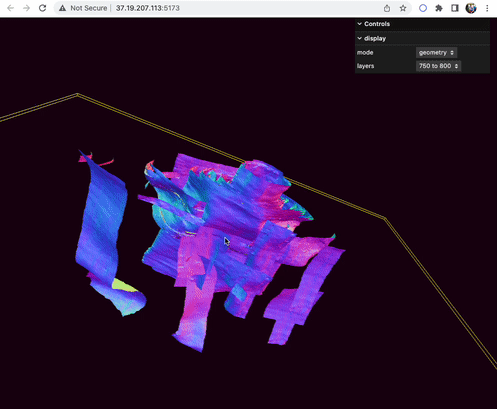Segmentation Tooling winners + new $50,000 prize!
Amazing work; congrats everyone!!
We wanted to get 1000-2000 cm2 of high-quality segments, which is not easy to do! We therefore set up a Segmentation Tooling prize, to incentivize the building of open source software to help segment the scrolls.
And it has worked! We have gotten some incredible submissions, and segmenters have done almost 500 cm2 so far. In this newsletter we’re announcing the winners.
These segments can be found on the data server (for the password, sign the registration form first), with more information on the Data Organization page.
They can also be viewed in volume-viewer, which was one of the winning submissions.
New prize: $50,000 Segmentation Tooling Prize 2
The segmentation tooling has come a long way, but at the same time it’s become harder to segment. After all, we got most of the low-hanging fruit done already.
That’s why we’re announcing another prize, which is similar to the previous one, but with some key difference:
Deadline September 15, 2023, 11:59pm PST.
3x$10,000 and 4x$5,000.
We’re heavily weighting submissions that:
help segment large and/or hard segments
Hard segments include those in regions without clear separation.
Hard segments might require operating in full 3D or using semi-automated methods that can follow papyrus fibers.
are actually used by segmenters!
We discourage late submissions! Work with the segmenters early on to have them try out your tools, get their feedback, and iterate.
We encourage building on top of existing tools that are proven to work.
Winners!
Without further ado, these are the winners of the first Segmentation Tooling Prize.
Optical Flow Segmentation by Julian / @RICHI: $10,000
Julian worked closely with the segmenters and made some incredible contributions to the existing Volume Cartographer tool. This not only included a completely new segmentation algorithm which is faster and better, but also tons of small productivity improvements. It’s easy to overlook those small improvements, but in aggregate they are very meaningful, and we definitely noticed. :)
Julian exemplified what we were looking for with this prize: working closely with people who actually do segmentation, getting feedback from them, and building stuff they need. The range of improvements, small and large, was impressive. Congrats!!
Khartes by Chuck / @khartes_chuck: $10,000
Khartes is the segmentation program a lot of us have been dreaming about for a long time. Chuck brought it into reality, and worked with segmenters to get feedback early on. Khartes still needs some work to be used at scale, but we were so impressed by its capabilities and Chuck’s iterative working style, that we’re excited to award him the $10,000 prize.
Masked data by James / @thatGuy: $5,000
Early on, segmenters needed to download a lot of large .tif files, which slowed them down. James came up with a great idea: masking out unused areas, which combined with compression, allowed for faster downloads and less disk space used on the segmenters’ computers. This was extremely useful in getting going quickly early on.
Volume-viewer by Yao / @Yao_Hsiao: $5,000
We put out an ask for a specific tool — being able to quickly view which segments have been done already — and Yao built it in no-time. Extremely useful to the segmenters, volume-viewer has been regularly used, and Yao has been iterating on its features with feedback from segmenters. Use it here with live data, and check out the code here.
Volume Annotate by Moshe / @moshelevy: $5,000
Moshe previous won an Open Source Prize with VolumeAnnotate, and has since not been sitting still. Iterating with feedback from segmenters, it seems quite close to getting used now, so we’re excited to award him another prize!
Scroll Viewer by Luke Farritor / @lukeboi: $5,000
Luke is another second-time winner. He upgraded Scroll Viewer to do a new kind of automatic segmentation, as well as functionality to stitch together smaller segments into a big, combined segment. Really cool work, and we can’t wait to see where he takes this, and if it can be soon used by segmenters! He also made a longer video here.
vesuvius-build and vesuvius-blender by Santiago / @spelufo: $5,000
Santiago made a useful set of data transformations, which power the incremental streaming of data into apps like VolumeAnnotate, and potentially more down the line. We want to encourage people to build fundamental tooling like this that enables important features in other tools. Santiago worked closely with us and others to make these data transformations useful.
He also prototyped a 3D approach to segmentation using Blender, which hasn’t been used by segmenters yet but is a neat idea, and could potentially be built on further to enable segmenting of harder areas.
Conclusion
We’re blown away by all the high-quality submissions. There were many more that sadly didn’t quite make the cut. We’ve linked them here in Discord.
We encourage everyone to stick around for the Segmentation Tooling Prize 2. Let’s together get to our goal of 1000-2000 cm2 high-quality, large segments!
Lastly, please make sure to check out the winning Ink Detection submissions being posted on the Kaggle forums. We’ll do a separate deep dive into those soon.



